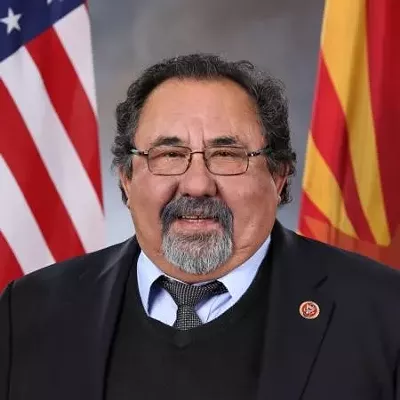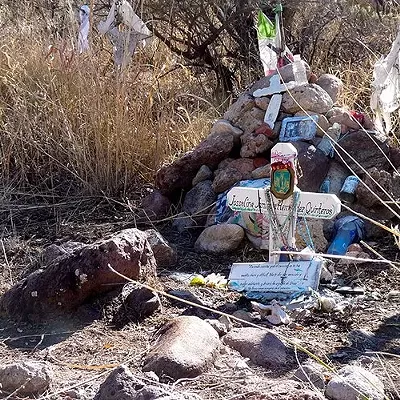After scant advertising, the county selected a caretaker, Richard J. Simpson, whose family moved into a Canoa house in mid-April.
But what was to be a showcase of county conservation of a historic land grant and former longtime cattle ranch is now the scene of a steady stream of migrants and debate over what the county should do to provide aid.
Even as supervisors have become flush with $5.7 million in new voter-approved bonds for more Canoa land and building preservation, they are confronted by the controversial eviction of Simpson, a self-styled U.S.-Mexico border-relations activist who gave aid to some desperate migrants while calling the Border Patrol and even the State Department on others.
On the property since mid-April, Simpson must move out by June 26, according to an eviction notice County Administrator Chuck Huckelberry is enforcing over the protests of Democratic Supervisors Richard Elias and Ramon Valadez.
Both insisted this week that Simpson, whose contract makes clear he has none of the protections of a county employee, be treated "fairly" and afforded "due process."
Elias said that a review of the situation "could mean" a delay in the eviction.
Valadez said he personally lacks all the facts.
"The bigger issue for me is of simple humanitarianism," Valadez said. "My belief, frankly, is if somebody shows up at your door and needs water, you give them water. If somebody shows up at your door and needs food, you give them food. I think of this even biblically."
Biblical is what Valadez's predecessor, Democrat Dan Eckstrom, went three years ago. He quoted scripture as he led the Board of Supervisors in a vote to help pay for water stations along the some of the deadliest of desert routes that Mexican and other immigrants take to illegally enter the United States.
Simpson's case blew up May 17 when he sent an e-mail to the Green Valley Chamber of Commerce seeking donations for International Border Relations. In that e-mail, Simpson identified himself as the president of the organization and included information about the death of a migrant on Canoa on May 15.
"This is exactly what I have been working for years," Simpson said in the e-mail to the Chamber of Commerce, "to change our immigration laws and reform the INS. Now I am here on the Canoa Ranch, halfway between Tucson and Nogales, Sonora. This is a highly trafficked area; at least 300 people pass through my property each night and day. I need donations to help keep supplying the people with food, water and medical supplies."
When county officials cited provisions of the caretaker's agreement, including the requirement that the caretaker immediately report all incidents of trespass, Simpson tried to backpetal, stating in a May 23 letter that he "had absolutely no plans to implement any large scale relief efforts."
Simpson is engaging, polite, not a bit shy about publicity and an accomplished name-dropper. He has ranched in California, as well as in Cochise and Santa Cruz counties, and has seen floods of immigrants. He seems to relish his role as a near saintly humanitarian who is full of ideas on managing Canoa. The daily media have not included Simpson's assertion that "on many occasions here on the Canoa Ranch, I have communicated with the U.S. Border Patrol. I also have worked with our State Department in regards to smuggling and terrorist activities on our U.S. soil."
He said he calls federal authorities when he suspects smuggling--drug or human.
Under his agreement, Simpson pays the county $250 a month in rent, provides security and repair (replacing fence, etc.) to the area and is to call county agencies--the sheriff, the county parks police, the county parks department and county real estate department--to report any trespass, vandalism and theft.
As his deadline approaches, Simpson is alternately conciliatory and combative in his desire to stay on Canoa with his son and his pregnant wife. Lawyers, he says, are waiting to fight the county for him.
"All kinds of nasty stuff could rain down on Pima County over this," Simpson said in an interview.
On Monday, Simpson pleaded with Huckelberry to rescind the eviction.
"I did not solicit any funding for relief efforts in the name of Pima County," Simpson told Huckelberry in an e-mail. "I know this whole thing could have been avoided if we only had a little communication."
Simpson has declared himself "an asset for the county. I am on the side of law enforcement and am a personal friend of the sheriff of Santa Cruz County, Tony Estrada."
Simpson also wrote to Gov. Janet Napolitano, a Democrat, on June 11 to tell her that he has "been in close contact with the Mexico Ministry of Foreign Affairs in regards to the deplorable treatment of their citizens here."
Simpson told the Weekly he was left high and dry on Canoa, with no clear instructions and no communication with the county. He has provided water and food to desperate migrants, including, he said, severely dehydrated young girls who were walking with their father through Canoa to get to Phoenix to see the girls' mother, who was dying of cancer.
The Rev. John Fife, the Presbyterian minister and founder of the Sanctuary Movement that served as an underground railroad for those fleeing El Salvador and Central America in the 1980s, said the county should adhere to the supervisors' vote to help place water stations in the desert, including Canoa.
Fife said the increase in migrant traffic at Canoa is further evidence of what he calls "the colossal failure" of Bush Administration's immigration policy.
"Those on the right want to do more, to put the military on the border, under the mistaken notion that you can close the border," Fife said. "Anyone with an ounce of experience on the border knows that's impossible."
The Rev. Robin Hoover, president and founder of Humane Borders, is staying out of the Simpson case.
"If anybody in town is concerned about migrant safety, it's us," Hoover said, noting that his group has put up 50 water stations and provides other aid to suffering border crossers. "But we cannot be involved in a county personnel issue, pure and simple."










